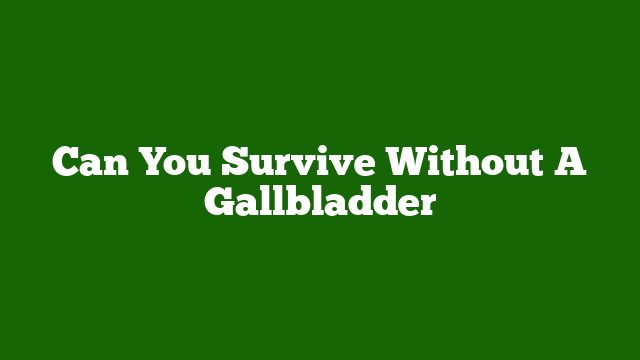Last Updated on June 12, 2023 by Umar
The gallbladder is a small, pear-shaped organ located beneath the liver.
Its primary function is to store bile, a substance that helps digest fats.
But what happens when the gallbladder is removed?
Can you survive without it?
In this comprehensive guide, we’ll explore personal stories, research, and statistics to provide you with the most detailed answer on the internet.
Personal Stories: Life After Gallbladder Removal
Many people have shared their experiences of living without a gallbladder, and the consensus is that it’s entirely possible to lead a healthy, normal life after the organ’s removal.
Here are some personal stories that illustrate this point:
- Story 1: Jane, a 35-year-old woman, had her gallbladder removed due to gallstones. After the surgery, she experienced some initial discomfort and had to adjust her diet. However, within a few months, she was back to her regular activities and felt better than ever.
- Story 2: Mike, a 50-year-old man, underwent gallbladder removal after suffering from severe abdominal pain. Post-surgery, he had to be mindful of his fat intake and make some dietary changes. Despite these adjustments, Mike reported that his overall quality of life improved significantly.
These stories demonstrate that while there may be some initial challenges, many people can successfully adapt to life without a gallbladder.
Research and Statistics: Gallbladder Removal Outcomes
Several studies have investigated the long-term effects of gallbladder removal, also known as cholecystectomy.
Here’s what the research says:
- Quality of Life: A study published in the Journal of Gastrointestinal Surgery found that patients who underwent cholecystectomy reported a significant improvement in their quality of life after the surgery . This suggests that removing the gallbladder can lead to positive outcomes for many individuals.
- Digestive Issues: Some people may experience digestive issues after gallbladder removal, such as diarrhea or bloating. However, these symptoms are typically manageable with dietary adjustments and, in some cases, medication .
- Long-term Health: Research indicates that there are no significant long-term health risks associated with gallbladder removal. In fact, a study published in the American Journal of Gastroenterology found no increased risk of developing chronic diseases, such as liver disease or cancer, in patients who had their gallbladder removed .
Tips for Living Without a Gallbladder
If you’re facing gallbladder removal or have already had the surgery, here are some tips to help you adjust to life without a gallbladder:
- Dietary Changes: Gradually introduce low-fat foods into your diet and avoid large, fatty meals. This can help prevent digestive issues and promote overall health.
- Stay Hydrated: Drinking plenty of water can help with digestion and prevent constipation.
- Exercise Regularly: Engaging in regular physical activity can improve digestion and overall well-being.
- Consult Your Doctor: If you experience any ongoing digestive issues or have concerns about your health, consult your healthcare provider for guidance and support.
In conclusion, it’s entirely possible to survive and thrive without a gallbladder.
While some adjustments may be necessary, many people report improved quality of life after gallbladder removal.
By following the tips outlined above and working closely with your healthcare team, you can successfully adapt to life without a gallbladder.

